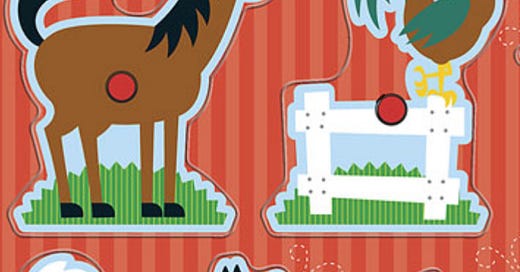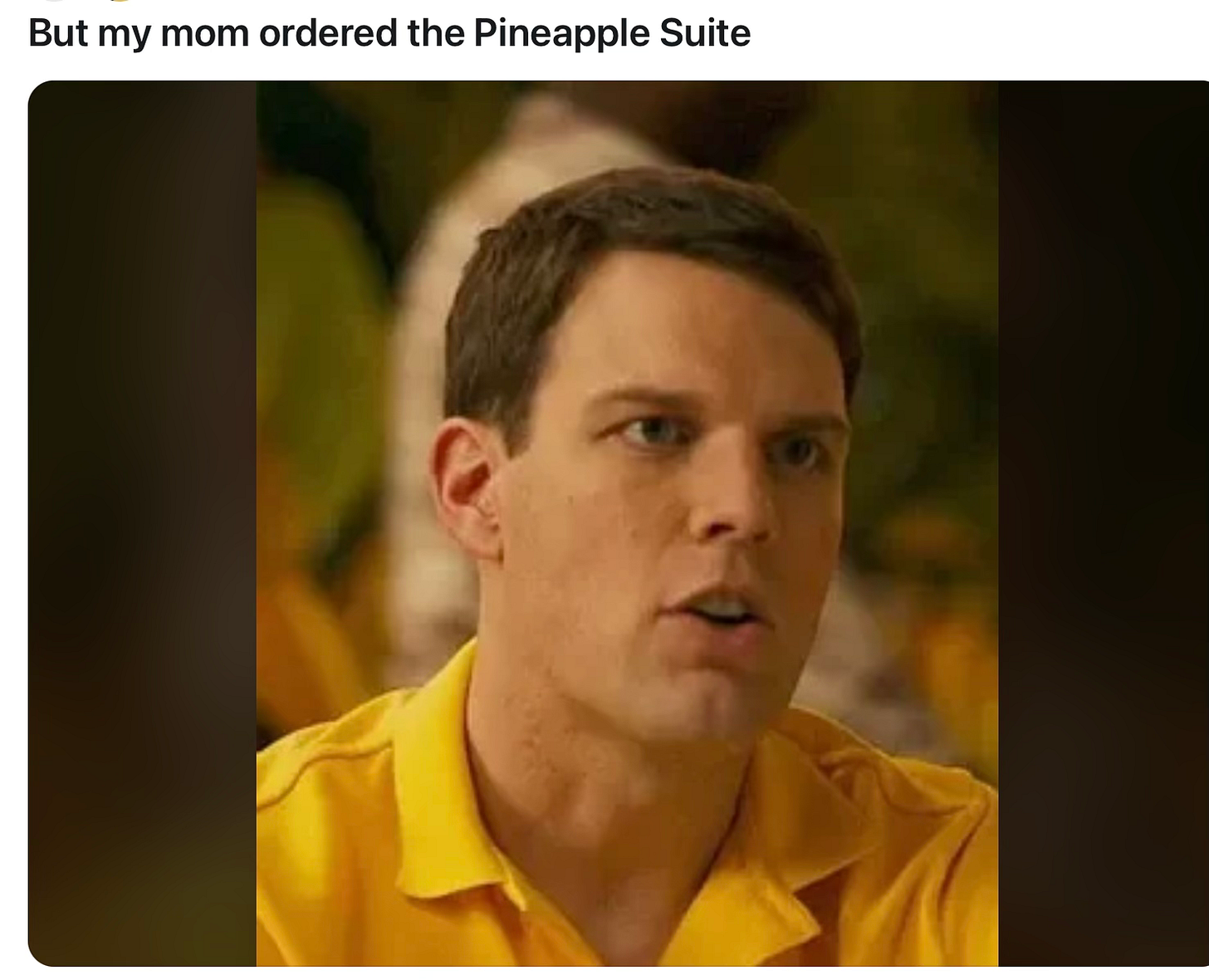In 1989 when our daughter was not yet two years old we applied to private nursery schools. It was for our daughter Lauren that we were seeking admission. My wife Debbie and I already knew our letters and numbers, how to tell time and, one of us, how to tie shoelaces.
But it felt like Debbie and I were the ones applying. Our family of three––our history, our destiny–– would be judged by the Manhattan nursery school gods. We were twenty-seven years old and felt like a great deal was at stake.
We were young parents, first of our friends to have children, so we neither received nor looked for advice. We remembered that the architect couple from whom we had purchased our West End Avenue apartment spoke highly of the Rodeph Sholom Nursery School where they sent their four children. They were selling because despite their design genius with built-ins everywhere, they couldn’t comfortably sustain a family of six in a 2,000 square foot apartment. They were moving back to Chicago.
Options
Debbie’s family were members of Temple Emanuel. Occupying an entire block on Fifth Avenue, Emanuel was at that time, and perhaps still is, the temple of the Jewish Establishment. The vibe was highly assimilated German Jews, the early wave of Jewish immigrants dating from the earlier part of the 19th century as opposed to the Eastern European Jews who came decades later.
Debbie and I were married at Emanuel in 1985. This was a time when Reform Judaism, the least traditionally demanding of the various denominations, was Jesuitical in stamping out Jewish rituals. So during our wedding, Emanuel prohibited us from reciting our vows under the traditional canopy of a chuppah or breaking a glass at the end of the ceremony. As well, no yarmulkes.
At the time, our faux-Jewish wedding ceremony didn’t bother us. So we applied to Emanuel’s nursery school because of Debbie’s family. We thought we’d get in.
I had grown up on 73rd and Park and had attended the Madison Presbyterian Nursery School, around the corner on 73rd and Madison. Convenience in the form of proximity or otherwise ruled much of what my family did.
We did not think of applying to Madison Presbyterian. We were Jewish so it would have seemed odd to us. As if we were rejecting our faith.
Also, I didn’t know how careful the school was in its record-keeping. As a teenager rummaging through my mother’s closet, I had discovered a Madison Presbyterian report card from my pre-kindergarten year in a shoebox (from Indian Walk, the politically incorrect named store where Park Avenue mothers went to buy their children’s shoes.)
My nursery school report card warned my parents that four year-old David liked to put his hands around other children’s throats and delighted in laughing at classmates who couldn’t complete puzzles.
Take from that what you will. I took from it that our daughter might pay for her father’s sins. Another reason we didn’t apply.
We had a strong family connection to Park Avenue Synagogue where my parents had been married in the Appleman Chapel named for my mother’s father Nathan Appleman. We felt that a chapel named for our daughter’s great-grandfather was a strong card to play. Almost a get-in-guarantee. So we applied there.
Finally, almost as an afterthought, we applied to the Rodeph Sholom Nursery School, remembering that the sellers of our apartment had recommended it to us. We didn’t know very much about Rodeph Sholom, hadn’t really heard about it before, and considered it our “safety” school.
A shocking lack of discretion
We were accepted at Emanuel. We were accepted at Park Avenue. But we were wait-listed at Rodeph. Wait-listed!
Two things happened immediately.
We became convinced that Rodeph Sholom was the only suitable school for us. The other two schools had shown a shocking lack of discretion in admitting us. Rodeph obviously had higher standards. And their standards were the ones we aspired to meet.
We played back to ourselves all our interactions during the Rodeph admissions process. One thing stood out. On a low table in the office of the admissions director, there was a wooden puzzle of four animal shapes, meant for toddlers. The kind with little knobs on the animals. I tried to fit the animals into their proper niches but struggled, then gave up. (Karma from my own nursery school days laughing at the puzzle failures of my classmates.)
Debbie was convinced that the admissions director had seen me fumble with the puzzle and had extrapolated that any child of mine would likely be an exceptionally slow learner. This brazen display of my incompetence, according to Debbie, had been the reason we had been waitlisted. At no other school interview had I been so foolish as to reveal my colossal spatial ineptitude. If I had just left the puzzle alone, all would have been right with the world.
Shameless Effort
By then it was February of 1990. During a snowstorm (of course), Debbie, then pregnant with our son Andrew, trudged through slushy streets to deliver a long, handwritten letter I had composed pleading with Rodeph Sholom to let us in.
Did I include my family connections to Jewish philanthropy? I can’t imagine that I didn’t. In went the Appleman Chapel. In went my great-grandfather’s founding of the Brooklyn Jewish Center. Desperation can breed shameless effort. Especially at the age of 27.
The letter did the trick and Rodeph relented. Our family’s happiness and overall future were secured. All three of our children ended up attending the Rodeph Sholom Nursery School and staying for the elementary school as well. The Rodeph Sholom community has been an important part of our family’s life ever since.
White Lotus Nursery School
The idea for this essay was sparked by the “water-cooler” item below from a recent post on
’s newsletter of which I’m a huge fan!“If you are an aspiring screenwriter, I implore you to subscribe to Town & Country. The way they report on the .01%’s relationship with education is incredible and I need a White Lotus-type show about 4-year-olds competing to get into private school in New York City.”
By the way, the current tuition for half-day “two’s” programs at Manhattan private schools is about $35,000. Kindergarten’s almost twice that.
I would definitely watch a show satirizing private school admissions madness. But I may not be qualified to write it as I’ve had a mostly serene experience with private schools and our children.
After attending Rodeph Sholom, my three children graduated from the Riverdale Country School where I served on the Board for about a dozen years, the last six as Chair. Over the years I’ve had the pleasure of recommending families for admission. Typically, it’s the children of people I know well and can vouch for as nice, which is a quality that the best private schools value highly in families.
OK, a story for the script
I do recall an admissions-related incident a long time ago that isn’t completely removed from the White Lotus-Pineapple Suite brand of uber-entitlement. A business acquaintance asked if I’d meet with a client of his who wanted to get his daughter into Riverdale. The connection was tenuous but I found it hard to say no. I was early in my career as a recommender.
The applying father took me to lunch at The Four Seasons Restaurant, in my memory still the restaurant that symbolizes the best of New York City. I can’t recall what we talked about except that his three year-old daughter was remarkably precocious. I remember the father being much older than I was, probably in his late 50’s or older. His daughter had to be the product of a late or subsequent marriage.
The next day I received a package from the father at my office. He had gifted me two, over-sized, expensive Taschen art books. I was being bribed! I didn’t know what to do with the books. I could have given them to the school but then I’d have to explain why. And returning the gift would be meeting one inappropriate act with another. So I just kept them unopened in my office.
His daughter was rejected. I was honest with Admissions that my connection with the family was a weak one. Still, they wouldn’t have held that against the application.
Soon after, I ran into the father at the entrance to a crowded charity event. He was angry with me about the rejection and asked me with a jab of his finger what kind of school could fail to see the uniquely outstanding qualities of his daughter, so obvious to everyone else he spoke to.
I mumbled something about few seats, many applicants. And disappeared into the crowd.
Meshugganah
The reality is that all parents of young children are alike. If the disappointed, art book-giving father’s behavior was over-the-top, irrational, and splenetic, who was I to cast judgment? Not me, the fumbling puzzle-man desperate to be accepted by the one school that turned us down, my desperation stemming solely from the fact that they had turned us down.
All parents become meshugganah (Yiddish for crazy) when judgment is cast on our young children. It’s a judgment that in our very human absurdity we unreasonably enlarge to a judgment of ourselves, to our past, and to our future.







It was such relief to leave NYC and all its various hyper ambitions. I attended private school in NYC and then public high school. That transition was profound. I was old enough, tenth grade, to understand how sheltered I’d been from reality and the devastating lessons of that shelter. One of the profound lessons of private school education never talked about is this simple lesson- that you (or your children) could not survive outside the bubble of private school (with everyone else). I HAD to go to my school because the public school would have eaten me alive.. extrapolate that lesson and you don’t have resiliency etc. There is a basic insecurity threaded through a population with disproportionate power. And an “othering.” Of course, there is truly much to fear in public education, especially these days. But do we ever talk on these terms? I’m so grateful to have taken economics with a room that included Black students who suddenly became vocal and animated from, yes, the back of the room, when the subject hit close to home. I saw immediately that their lack of participation was not indifference or whatever judgement I’d unwittingly carried in my person for where they chose to sit, but the content and relevance of what we were learning to their lives and history. I felt deep shame for all I’d bought into. The discussion of taking unemployment among a mix of socio economic classes was also something I’ll never forget. And then there was the day we discussed affirmative action… None of this would have ever happened in my private school. It was life altering.
I remember an NPR(?) piece about a woman who taught at a poor NYC public school. She had a very bright black student who she thought would thrive at an elite girls private school that offered scholarships. She took that girl and others to visit the school. The kid she was mentoring got angry and left, and lost contact with her teacher. Years later, the teacher found her and asked her why she became so angry that she disappeared and quit going to school. The young woman said that this was the first time she had seen how rich people lived. She had never seen anything like it outside of TV and she knew TV was fake. Only it wasn’t. This was worse: it was the manifestation of how the people who ran the city cared nothing for poor kids in decrepit crumbling public schools. The meritocracy is a lie.